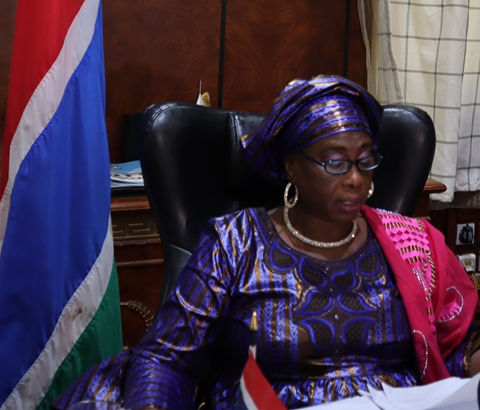The Gambia’s Vice President, Dr. Isatou Touray, on 11th July 2021 said the promotion of Sexual and Reproductive Health and Rights remain a national priority for the government, especially given its significance in sustainable development.
VP Touray said this on the occasion of World Population Day 2021 under the theme “Rights and Choices are the Answer: Whether baby boom or bust, the solution lies in prioritizing the reproductive health and rights of all people”
She said the government of The Gambia recognizes the fact that Sexual and Reproductive Health and Rights is key enabler of the strategic priorities in achieving National Development Goals.
“The manifestation of this is not only reflected in key strategic interventions of government through its agencies in the realm of Sexual and Reproductive Health, but the engineering of sound progressive policies and instruments that are relevant and geared towards the attainment of the three transformative zeros such as the Reproductive Health Policy (2017-2026) and Strategy (2017-2021), the Family Planning Policy (2019-2026) and a cost Implementation Strategy (2019-2022) among others. Through the 8th UNFPA funded Country Programme, the government of The Gambia has taken giant strides towards achieving universal access to quality SRH in all public health facilities in The Gambia. Capacity building programmes have been conducted for health workers and Community-Based Distributors, different health facilities refurbished, maternal lifesaving drugs and free contraceptives provided through the programme among others,” she said.
Speaking further, Madam Touray said the government recognizes that access to Family Planning is not only a human right, but it saves lives and promotes healthier populations, more efficient health systems and stronger economies.
Consequently, she said the government is making significant progress in addressing Family Planning, as one of the fundamental pillars of safe motherhood and reproductive health rights.
“Evidence of achievements in this regard is reflected in the recent DHS report (2019-2020). Data from the DHS shows that the use of Family Planning has increased from 9% in 2013 to 19% in 2019-20. The demand for family planning among married women has increased from 34% in 2013 to 43% in 2019-2020. Unmet need for family planning has remained unchanged during this period. The Total Fertility Rate has fallen from 5.6 (DHS 2013) to 4.4 (DHS 2019-2020) with variations based on place of residence, LGA and level of education. Though gains have been made, there is the need to call for allocation of more resources and intensify the provision of Reproductive Health information and services to achieve our goal of Zero unmet need for Family planning by 2030,” she said.
She also said the Government of The Gambia wishes to reiterate the commitments made at the Nairobi Conference on ICPD +25 in November, 2019 and will continue to intensify focus and attention to safeguard the sexual and reproductive health and rights of women and girls to achieve the three transformative zeros by 2030, cognizant of its enabling factor towards National Development Goals.
“The Gambia Government, knowing the significance of sexual and reproductive health and rights to sustainable development, like several other countries at the 1994 International Conference on Population and Development, committed to providing sexual and reproductive health services for all, a commitment reiterated in 2019 at the Nairobi Summit, where The Gambia government committed to the three transformative zeros (ending all maternal deaths, unmet need for Family Planning and gender-based violence and harmful practices towards women by 2030). The importance of sexual and reproductive health and rights was also highlighted at the 69th ordinary session of the United Nations General Assembly during a side event, where global leaders agreed that key sustainable development goals such as poverty eradiation and ending AIDS epidemic by 2030 cannot be achieved without the promotion of sexual and reproductive health and rights. This statement is more valid in our current reality. Emerging from this pandemic where there are looming fears that the crisis could curtail support for women’s and girls’ decision making, agency, freedom of movement or access to health services and, more generally, preventing people from exercising their sexual and reproductive health and rights. This may be a major setback in our longstanding efforts towards the attainment of the three transformative zeros and by extension the sustainable development goals by 2030.Therefore appropriate policy responses on the sexual and reproductive health and rights of women are needed to safeguard our hard-fought gains and keep us on track to achieving the sustainable development goals, making the theme for the 2021 World Population Day relevant and timely vis-à-vis the crisis emanating from the COVID-19 pandemic,” she said.
Commenting on the Covid-19 pandemic, Madam Touray, said the deadly disease has caused serious gaps and challenges in the provision of sexual and reproductive health information and services, with the reallocation of resources away from these services taking a toll on the health of women and girls.
“It has exacerbated gender inequality and gender-based violence and with programmes to address harmful practices interrupted, there are signs that Female Genital Mutilation and Child Marriage are on the rise. Furthermore, women and girls have been hit the hardest in terms of the overall economic impact of the pandemic. Consequently, the pandemic has resulted in changing fertility and demography in countries,” she said.
“As we continue to fight against the Pandemic, it is pleasing to note that 42,975 people have received the first doze of the AstraZeneca vaccine while 11,825 people have been fully vaccinated as of July 7th, 2021. The Government remains committed to making Gambia a COVID-19 free country,” she added.
Madam Touray acknowledged the contributions of all the United Nations agencies, the World Bank, the European Union, the African Development Bank, and other development partners for their continued support to population and development in The Gambia.





















